Still of the Night Blu-ray Movie
HomeStill of the Night Blu-ray Movie 
Kino Lorber | 1982 | 91 min | Rated PG | Aug 11, 2015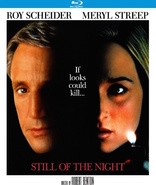
Movie rating
6.6 | / 10 |
Blu-ray rating
| Users | 0.0 | |
| Reviewer | 2.5 | |
| Overall | 2.5 |
Overview
Still of the Night (1982)
A Manhattan psychiatrist probes a patient's murder and falls for the victim's mysterious mistress.
Starring: Roy Scheider, Meryl Streep, Jessica Tandy, Joe Grifasi, Sara BotsfordDirector: Robert Benton
| Crime | Uncertain |
| Drama | Uncertain |
| Mystery | Uncertain |
Specifications
Video
Video codec: MPEG-4 AVC
Video resolution: 1080p
Aspect ratio: 1.85:1
Original aspect ratio: 1.85:1
Audio
English: DTS-HD Master Audio 2.0 Mono (48kHz, 16-bit)
Subtitles
English
Discs
25GB Blu-ray Disc
Single disc (1 BD)
Playback
Region A (C untested)
Review
Rating summary
| Movie | 3.0 | |
| Video | 2.5 | |
| Audio | 3.0 | |
| Extras | 0.5 | |
| Overall | 2.5 |
Still of the Night Blu-ray Movie Review
Too Still
Reviewed by Michael Reuben August 10, 2015Yes, Meryl Streep can do anything. In 1982, following her Oscar win for Kramer vs. Kramer, Streep re-teamed with that film's writer and director, Robert Benton, for a thriller that borrowed more directly from Alfred Hitchcock than anything ever made by Brian De Palma, who's the filmmaker most often accused of ripping off Hitchcock. As co-written by Benton and David Newman, Still of the Night consciously lifts so many elements from Spellbound, The Birds, North by Northwest and other Hitchcock classics that it's almost a film school assignment. Streep plays the typical Hitchcock blonde, mysterious, irresistible and possibly lethal, her hairstyle reminiscent of Eva Marie Saint's in North by Northwest. Still of the Night received respectable reviews and did acceptable box office, but it hasn't aged well. Unlike Hitchcock and De Palma, each of whom uses cinematic technique to probe deep-seated obsessions and primal fears, Benton seems to be engaged in a craftsman's exercise. His effort feels oddly detached, as if he were doing an intriguing experiment just to find out what happens. His thriller never establishes that peculiar intimacy with the viewer that makes Vertigo, Dressed to Kill or The Silence of the Lambs such unforgettable experiences. It's a technical feat that never gets under your skin.
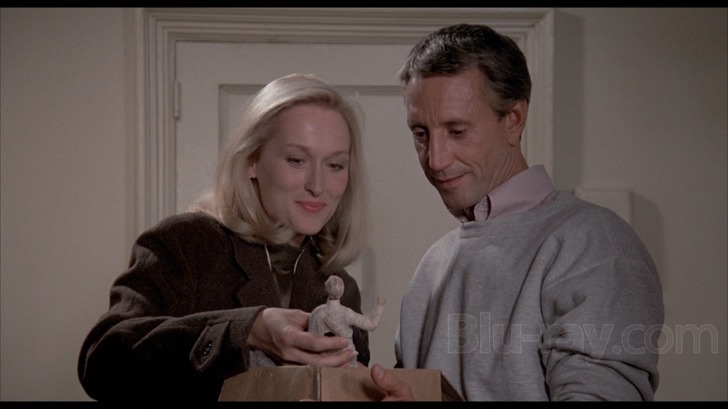
The body of George Bynum (Josef Sommer, in extended flashbacks) is discovered with multiple stab wounds. Bynum was a senior appraiser at Crispin's, a venerable auction house modeled on Christie's. For the last two years, he had been seeing psychiatrist Dr. Sam Rice, who is played by Roy Scheider in a curiously restrained performance. Following Bynum's death, Dr. Rice receives two visits. One is from the NYPD officer investigating the case, Det. Joseph Vitucci (Joe Grifasi), who tells him they believe Bynum was killed by a woman. The other is from a furtive blonde named Brooke Reynolds (Streep), who asks the doctor to return Bynum's watch to his wife. Brooke worked for Bynum at Crispin's, and she doesn't want Mrs. Bynum to learn that she and George Bynum were having an affair. Sam Rice knows all about Brooke, because Bynum talked about her in his sessions. As the doctor reviews his notes and makes excuses to see Brooke again, he finds himself drawn to her, and even a little obsessed. He can't explain why. Does Rice somehow feel responsible for his patient's death? Is he emotionally vulnerable because of his recent divorce? Has he fallen victim to the "wounded bird" syndrome because of Brooke's obviously troubled demeanor? Or is he being manipulated by a calculating murderess who is concerned about what Bynum may have revealed to Dr. Rice in therapy? Any and all of these are possibilities, but one thing is established for certain—someone is stalking Sam Rice with deadly intent. Hitchcock's heroes often acted questionably, but the Master of Suspense always cast such roles with actors to whom the audience would remain warmly inclined in spite of their mistakes (think of Jimmy Stewart in Vertigo). Scheider can be a magnetic screen presence, but here Benton has him withholding any semblance of charisma, which makes Sam Rice something of a dead zone in a place where the film needs a vital presence. It doesn't help that Sam's only solid relationship appears to be with his mother, Grace (Jessica Tandy), a fellow shrink who tells him to stay away from Brooke. While Grace does provide valuable assistance in interpreting a significant dream described by Bynum during a session, she makes her fully grown son look like a mama's boy tied to the apron strings. (No wonder he's divorced.) Benton engineers some clever riffs on famous Hitchcock scenes (including, for example, his own variation on Cary Grant's auction "diversion" in North by Northwest), and he has written a challenging scene for Brooke Reynolds that only an actress of Streep's caliber could bring off successfully (which she does). But when we come to the shocks and reveals that make up the finale, the film underwhelms, because the tension hasn't been wound up tightly enough. Sam Rice hasn't been sufficiently engaging, and, accordingly, Brooke Reynolds hasn't become sufficiently alluring. Together the two don't generate enough heat to make the question of whether their future holds love or murder feel anything more than academic. Perhaps Benton's most curious decision was to use almost no music on the soundtrack, a radical departure from Hitchcock, whose collaboration with composer Bernard Hermann is legendary. Hermann's instrumentals (and Pino Donaggio's for De Palma's thrillers) are an essential ingredient in involving the audience and rousing their emotions. By forgoing such devices, Benton may have believed he was pursuing greater "purity" in his cinematic art, but all he accomplished was to lessen the impact of every scene in which he tried to create suspense.
Still of the Night Blu-ray Movie, Video Quality 
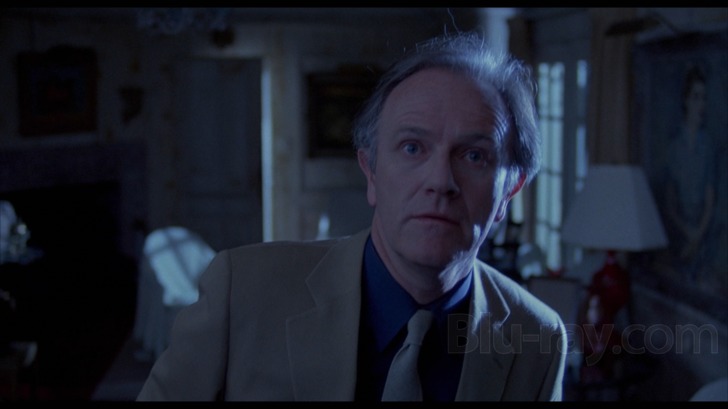
Still of the Night was shot by the eminent Spanish cinematographer Néstor Almendros, re-teaming with Benton after Kramer vs. Kramer. Famous for preferring natural light, Almendros won an Academy Award for shooting Terrence Malick's Days of Heaven, much of which was photographed during the brief interval immediately after sunset known as "magic hour". As with its other titles licensed from MGM, Kino has presumably sourced its 1080p, AVC-encoded Blu-ray of Still of the Night from a master provided by the studio. The transfer supplied by MGM is of disappointingly poor quality. Plagued by frequent and intrusive video noise, the transfer also suffers from inconsistent blacks and weak colors, all of which detract from the moody atmosphere that Benton and Almendros attempted to create. Because he preferred natural light and learned his craft before the film industry was transformed by home video, Almendros was never concerned about graininess in film, and some viewers will no doubt mistake the noisiness in this image for film grain, which is also visible but of a distinctly different quality. The goal of an accurate Blu-ray presentation is to recreate, in the digital domain, the film's natural grain pattern without adding extraneous noise. MGM and Kino have failed in that mission here. Still, the transfer has captured enough detail to allow appreciation for Benton's deliberate shot composition, and the colors are good enough to distinguish between the different palettes of the present, the past and George Bynum's critical dream sequence. The Blu-ray is watchable—just. Kino has mastered Still of the Night with an average bitrate of 24.93 Mbps, which is probably adequate. It's possible that some minor compression artifacts are concealed by the video noise, but at a certain point there's little purpose in distinguishing between flaws.
Still of the Night Blu-ray Movie, Audio Quality 
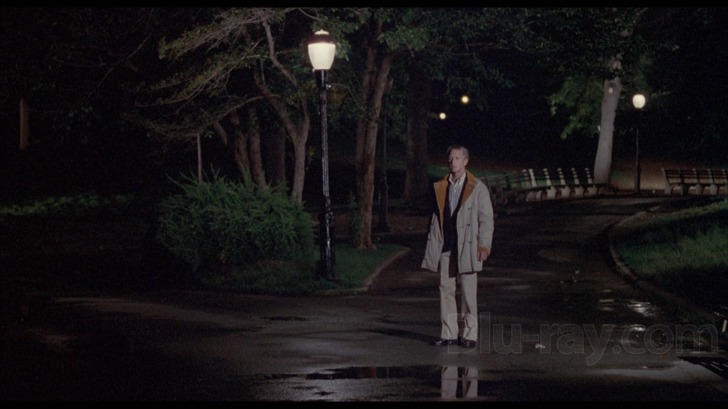
The film's original mono track has been encoded as lossless DTS-HD MA 2.0, with identical left and right channels. It's a perfectly adequate track with clear dialogue, good sound effects and a tuneful rendition of the theme song by John Kander (the composing half of the team of Kander & Ebb, who wrote Chicago and Cabaret, among others). As discussed in the feature section, the film has very little underscoring.
Still of the Night Blu-ray Movie, Special Features and Extras 
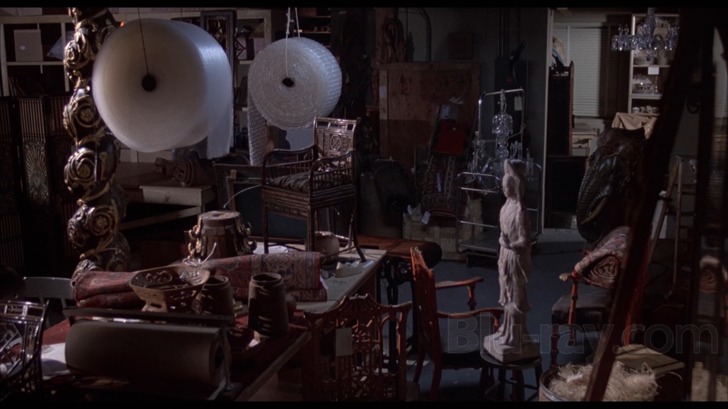
The only extra is a trailer (1080p; 1.85:1; 2:06), plus trailers for two other films released on Blu-ray by Kino and featuring Roy Scheider (Last Embrace and 52 Pick-Up).
Still of the Night Blu-ray Movie, Overall Score and Recommendation 
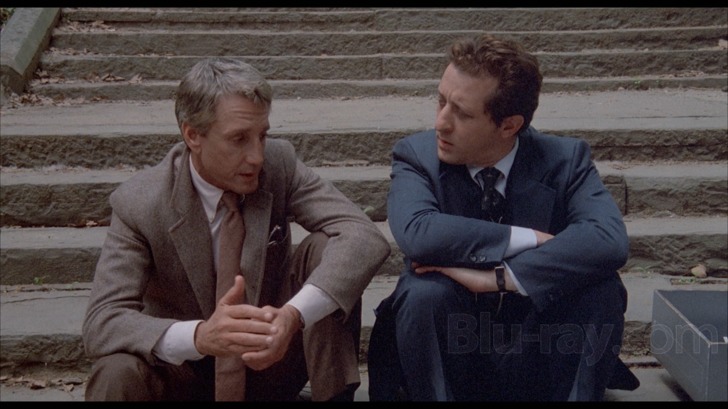
In an interview several years ago, Streep was asked to name a bad movie in which she'd appeared, and she picked Still of the Night. That alone should make the film interesting, but I disagree that the film is bad or that she's bad in it. (Now, She-Devil is another story.) It falls short of its aspirations, but in so doing it provides an informative perspective on the mechanics of creating a thriller. It also contains several well-crafted sequences. It's too bad that Kino's Blu-ray is such a mediocre affair. If you're interested, wait for a sale.
Similar titles
Similar titles you might also like

Nightkill
1980

The Death Kiss
1932

I, the Jury
1982

A Kind of Murder
2016

Cruising 4K
Limited Edition
1980

Dark Crimes
2016

Who Killed Teddy Bear 4K
Standard Edition
1965

The Outsider: The Complete First Season
2020

The Mystery of the Wax Museum
Warner Archive Collection
1933

Windows
1980

They Look Like People
Slipcover in Original Pressing
2015

The Strange Case of Doctor Rx
1942

Dead Man's Eyes
1944

The Secret of the Blue Room
1933

The Blood Beast Terror
2K Restoration
1968

The Rosary Murders
1987

Manhunter
Collector's Edition
1986

Fear City
1984

A Study in Scarlet
1933

And Then There Were None
BBC
2015